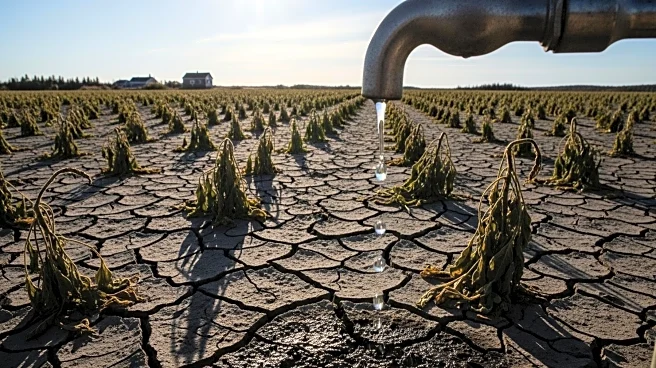What is the story about?
What's Happening?
Farmers in Newfoundland and Labrador are experiencing a crisis due to an unusually hot and dry growing season. Wayne Simmons, president of the Newfoundland and Labrador Federation of Agriculture, reported that the adverse weather conditions have severely impacted the province's agriculture sector. Many vegetable farms have suffered near-total crop failures, and dairy farmers are struggling to find grass and hay for their cows, which is costly to import. Berry farmer Philip Thornley noted that the lack of water has resulted in smaller, less ripe fruits. Both Simmons and Thornley attribute these challenges to climate change, which is increasingly affecting farming practices in the region.
Why It's Important?
The crisis in Newfoundland and Labrador's agriculture sector highlights the broader impact of climate change on farming communities. As weather patterns become more unpredictable, farmers face increased risks of crop failures and reduced yields, which can lead to financial instability. The situation underscores the need for adaptive strategies, such as irrigation systems, to mitigate the effects of dry seasons. The availability of funding through Agriculture and Agri-Food Canada for climate change projects offers some relief, but long-term solutions are necessary to ensure the sustainability of agriculture in the region.
What's Next?
Farmers in Newfoundland and Labrador may need to consider implementing irrigation systems to cope with future dry seasons. Simmons has already begun contemplating this option for his farm, marking a significant shift in traditional farming practices in the area. The Federation of Agriculture has announced $7.5 million in funding to support projects addressing climate change, which could help farmers adapt to changing conditions. As climate change continues to impact agriculture, farmers will need to explore innovative solutions to maintain productivity and profitability.
Beyond the Headlines
The challenges faced by farmers in Newfoundland and Labrador reflect a larger trend of climate change affecting agriculture globally. As weather extremes become more common, farmers everywhere will need to adapt to new conditions, potentially altering traditional farming methods. This shift may also influence consumer behavior, as local produce becomes less available, prompting a reevaluation of food sourcing and sustainability practices.














